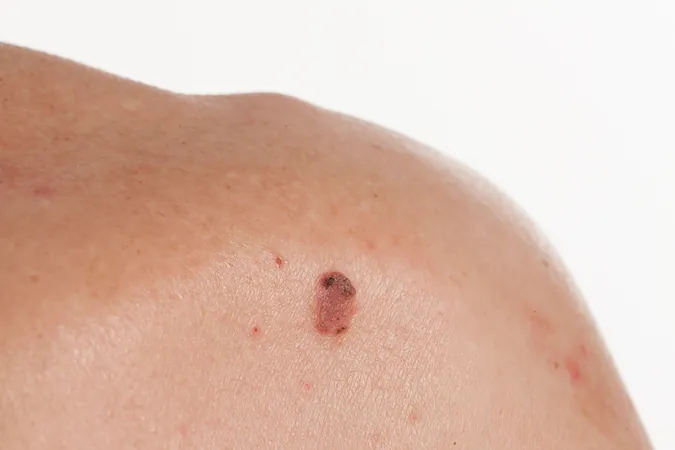
Autoimmune Disease Patients at Greater Risk for Skin Cancer: Shocking New Findings!
2025-04-08
Author: Rajesh
Patients battling mucous membrane pemphigoid (MMP) are facing alarming news: they are nearly twice as likely to develop certain types of skin cancers when compared to the general populace. This startling revelation comes from an extensive study published in Frontiers in Medicine, led by Dr. Philip Curman from Karolinska University Hospital in Sweden.
Study Overview
The study scrutinized data from over 117 million individuals across the United States. Results indicated that those with severe MMP show an astounding 1.9-fold increased risk of squamous cell carcinoma—the most common skin cancer—and a 1.5 times higher risk for basal cell carcinoma. Overall, these patients face an 80% greater risk of non-melanoma skin cancers compared to matched controls.
What is Mucous Membrane Pemphigoid (MMP)?
MMP is a rare autoimmune disease that primarily wreaks havoc on mucous membranes, leading to painful erosions in various areas including the mouth and eyes. Approximately 25% of patients also develop skin lesions. While the disease can affect anyone, it predominantly strikes women and often begins in individuals during their 70s. The ramifications can be devastating, as MMP may lead to complications like blindness and chronic pain due to restrictive scarring in the esophagus.
Treatment Approaches
In managing MMP, treatment approaches vary based on severity. Mild cases may be treated with anti-inflammatory medications and topical corticosteroids, whereas patients with more severe manifestations—especially those affecting the eyes—typically require systemic corticosteroids and long-term immunosuppressive therapies. Unfortunately, the latter can weaken the immune system, making it more difficult for the body to detect and fight off potential malignancies.
Early Cancer Risk
What is particularly concerning is that the increased risk of skin cancer manifests relatively quickly; it has been noted that elevated cancer prevalence appears within the first five years post-diagnosis. This indicates that drug treatment alone isn't the sole culprit in raising skin cancer risks, highlighting the importance of understanding the complex interplay between chronic inflammation and immunosuppressive therapies.
Recommendations from the Study
These findings emphasize the imperative for regular skin cancer screenings and tailored monitoring for MMP patients, particularly those with more severe cases. Incorporating dermatological screenings into routine care could pave the way for early detection and prompt treatment.
Limitations of the Study
However, the findings do come with limitations. The lack of specific autoantibody data meant that researchers were unable to explore potential variations among different MMP subtypes. Additionally, the reliance on prescribed medications as indicators of disease severity could limit the accuracy of the severity stratification.
Conclusion
Despite these limitations, the study’s large and diverse cohort allows for the generalization of these findings and generates critical insights into the risks faced by both mild and severe MMP patients. In conclusion, if you or a loved one is dealing with MMP, this groundbreaking research serves as a crucial reminder of the heightened skin cancer risk affiliated with the condition. Staying vigilant through regular skin checks and consultations with healthcare providers can mean the difference between life and death. Don’t wait until it’s too late—knowledge is your best defense!


 Brasil (PT)
Brasil (PT)
 Canada (EN)
Canada (EN)
 Chile (ES)
Chile (ES)
 Česko (CS)
Česko (CS)
 대한민국 (KO)
대한민국 (KO)
 España (ES)
España (ES)
 France (FR)
France (FR)
 Hong Kong (EN)
Hong Kong (EN)
 Italia (IT)
Italia (IT)
 日本 (JA)
日本 (JA)
 Magyarország (HU)
Magyarország (HU)
 Norge (NO)
Norge (NO)
 Polska (PL)
Polska (PL)
 Schweiz (DE)
Schweiz (DE)
 Singapore (EN)
Singapore (EN)
 Sverige (SV)
Sverige (SV)
 Suomi (FI)
Suomi (FI)
 Türkiye (TR)
Türkiye (TR)
 الإمارات العربية المتحدة (AR)
الإمارات العربية المتحدة (AR)